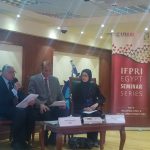The Faculty of Agricultural and Food Sciences (FAFS) at the American University of Beirut (AUB) hosted two exciting consecutive launches on Tuesday, June 18, 2019. The first session was the launch of the IFPRI 2019 Global Food Policy Report: Revitalizing Rural Areas in Lebanon and the second was the soft launch of the World Bank Group (WBG) DigitalAG4MENA Competition.
News: “100 Million Health” Initiative and the Double Burden of Malnutrition in Egypt
Mai Mahmoud and Sikandra Kurdi - IFPRI Egypt
Egypt's recent national campaign "100 Million Health" is an evidence of the country's commitment towards eradicating the "silent epidemic" of Hepatitis C and raising awareness for controlling the spread of non-communicable diseases (NCD) such as high blood pressure, diabetes and obesity.
Water-Energy-Food Nexus Assessment Study for Sudan
On February 12, 2019 the Arab Organization for Agricultural Development (AOAD) hosted the Validation Workshop for discussing the findings of the Water-Energy-Food Nexus Assessment Study for Sudan in Khartoum. The study formed part of the Nexus Regional Dialogue (NRD) in the MENA region, co-funded by the EU and BMZ “Nexus Dialogues Programme” and aims to align national strategies, policies and implementation plans with a national Nexus framework as an operational guidance to Sudan.
الدروس المستفادة من البرامج القطرية للمعهد الدولي لبحوث السياسات الغذائية
فرانك پلاس، وپيتر هازل، المعهد الدولي لبحوث السياسات الغذائية
كثيرًا ما يقال إنه كلما ازداد التعاون بين الباحثين وصناع السياسات، كلما زادت احتمالية استخدام الأدلة التي يتوصل إليها الباحثون في القرارات المتعلقة بالسياسات، وأن المهمة البحثية تكون أفضل عندما يقيم الباحث في البلد التي يُجري فيها البحث. خضعت تلك المفاهيم للاختبار من خلال مجموعة من الدراسات الحديثة التي تناولت الإسهامات التي قدمتها الاستراتيجية اللامركزية الخاصة بالمعهد الدولي لبحوث السياسات الغذائية، وعلى وجه التحديد البرامج القطرية التي ينفذها، في نواتج السياسات والآثار اللاحقة
Lessons from IFPRI country programs on influencing policy decisions and strengthening capacity
Frank Place and Peter Hazel, IFPRI
It is often argued that the more researchers engage with policymakers, the more likely that their evidence will be used in policy decisions; also, that engagement is enhanced when researchers reside in the countries where they are conducting research. These notions were put to the test in a recent set of studies that examined the contributions of IFPRI’s decentralization strategy, and in particular its country programs (CPs), to policy outcomes and subsequent impacts.




